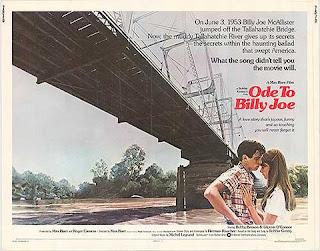
“It was the third of June, another sleepy, dusty, delta day”.
Inspired by Bobby Gentry’s hit 1960s tune of the same name, producer / director Max Baer’s Ode to Billy Joe is the sweet, incredibly dramatic tale of a young girl longing to be woman, and the events that propelled her into adulthood far too early.
It’s 1953 in rural Mississippi. 15-year old Bobbie Lee Hartley (Glynnis O’Connor) crosses the Tallahatchie bridge every day while walking home from school, and more often than not her childhood friend Billy Joe McAllister (Robby Benson) is there waiting for her. It seems Billy Joe, who works at the sawmill with Bobbi’s older brother James (Terence Goodman), has developed quite a crush on Bobbie Lee, and does his best to win her affections
Though she plays coy, Bobbie Lee has feelings for Billy Joe as well. Her father (Sandy McPeak), however, thinks she’s too young to start dating boys. As Bobbie Lee is doing her best to convince her dad that she’s a woman, Billy Joe has an experience that changes his life, and may spell the end of his relationship with Bobbie Lee before it ever begins.
Benson delivers a convincing performance as the title character, from the exuberance and frustration of young love to the high drama of a drunken escapade that rocks his character’s world. Yet Ode to Billy Joe isn’t so much Billy Joe’s story as it is Bobbie Lee’s, and Glynnis O’Connor positively shines as the anxious teen out to prove to her father and mother (Joan Hotchkis) that she’s grown up, and ready for all that life in Mississippi has to offer. O’Connor and Benson, who also played a romantic duo a few years earlier in Arthur Barron’s Jeremy, have a palpable chemistry, and their scenes together are both sweet and touching (at least until the final act, when drama and tragedy take center stage). Yet it’s those moments when Bobbie Lee is confiding in her mother, or challenging her father, that are truly magical. Also turning up in a supporting role is James Best, as the proprietor of the local sawmill.
Shot on-location in Mississippi’s LeFlore and Tallahatchie counties, Ode to Billy Joe benefits from the local flavor that Baer and his team conjure up throughout the movie. The Tallahatchie Bridge is dilapidated, but has plenty of personality, and we get a real sense of the entire community as the story unfolds. There’s even a dramatic early sequence set on the fabled bridge, where Bobbie Lee’s father has a run-in with some drunk hillbillies trying to cross from the other side.
Those familiar with Bobby Gentry’s hit song already know that this story will end badly; Billy Joe McAllister will kill himself by jumping off the Tallahatchie bridge. But while the song tells us the “what”, the movie answers the “why”. Why did Billy Joe commit suicide? As a fan of the song, I had my theories prior to seeing the movie (one of which is the same assumption everyone in town makes), but I have to give kudos to writer Herman Raucher, who, with the twist he conceived, brought a poignancy to Billy’s suicide and the immediate aftermath.
An effective coming-of-age tale as well as a stirring tragedy, Ode to Billy Joe is a movie that will haunt you for days.
Rating: 9 out of 10
